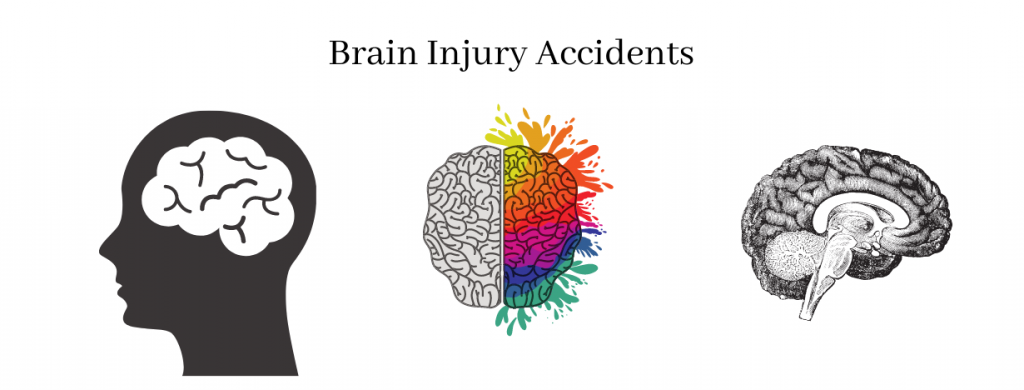Brain Injury
Obtaining Justice for Uniquely Devastating Injuries
PRACTICE AREAS


Motor Vehicle Accident
Our client stopped at the stop sign and was hit by another vehicle causing brain injuries
Our client stopped at the stop sign and was hit by another vehicle causing brain injuries
Free Case Evaluation
Contact Us now
Brain Injury
Obtaining Justice for Uniquely Devastating Injuries

No part of your body is better protected than your brain. In addition to the skull itself, there are multiple layers of membrane and fluid surrounding the brain, all of which work in tandem to help cushion it from the impact of an injury.
Nature goes to such great lengths to protect the human brain for a very, very good reason: the brain is the center of the nervous system, and any injury – even a mild one – can have severe consequences. Other bodily injuries can be devastating, but your skull contains all of you – your entire personhood, memory, and sense of self.
In spite of all this, however, brain injuries can and do happen. The skull and membranes beneath can only provide so much protection against a much bigger and more powerful object. That is why nearly three million people are hospitalized for traumatic brain injury every single year, and tens of thousands are killed.
These are dispiriting numbers, but you should know that if you’ve suffered a brain injury, you are not alone. We have seen countless cases of brain injury in our practice. We have fought many of these brain injury cases, and we have won. And if your brain injury was someone else’s fault, we will fight to hold them to account for what they did to you.
Understanding Brain Injury
You’re probably looking for justice for your injuries rather than a scientific treatise, and so we don’t want to get too technical here: you’d literally have to be a neuroscientist to understand all the ins and outs of brain injuries.
But we’ve found that some doctors do a surprisingly poor job of explaining these issues to patients, so if you’re confused, here’s the rundown.
First, there are two types of acquired brain injury:
- Traumatic brain injuries involve external force, most often a blow to the head. However, a traumatic brain injury may also occur because of severe shaking or jolting which causes the brain to strike against the skull, even if there is no blow to the head.
- Non-traumatic brain injuries involve a variety of factors which can harm the brain without any direct trauma, including strokes, disease, drug overdose, near-drowning, electric shock, neurotoxic poisoning, and more.
Traumatic brain injuries have many causes. Some of the most common include car accidents, slip-and-fall accidents, product liability cases, and workplace injuries.
Although we deal primarily with traumatic brain injuries in this article, much of what we say applies to certain types of non-traumatic brain injuries as well. If you were injured in a non-traumatic brain injury – for instance, as a result of medical malpractice – then you may have standing to sue.
Fortunately, the damage from a brain injury is not always permanent. For instance, concussions are one of the most common types of traumatic brain injury, and in many cases, people recover fully (although if you get multiple concussions, the damage may start to add up over time).
Despite this, all brain injuries should be taken very seriously. Sometimes, the effects of a brain injury do not show up immediately, and it can take a while – perhaps months – for you to detect that there is a problem. That is why you should seek medical attention for all potential brain injuries, even those which seem minor.
How do you know if you or someone around you has suffered a brain injury? There are a lot of symptoms, and they may vary in severity depending on how serious the injury was, but some of the most common symptoms include:
- Loss of consciousness.
- Nausea and vomiting.
- Headaches.
- Confusion and mood changes.
- Drowsiness.
- Pupil dilation.
- Seizures.
- Lack of balance and coordination.
Again, this is not a full list and all potential brain injuries should be checked out by a doctor before any diagnosis is made.
How We Can Help You Sue for a Brain Injury
Anyway, those are the basics of how brain injury happens. How do you know if you have standing to sue?
Well, generally you will have to prove that another party – the defendant – was negligent. The negligence standard applies in most types of personal injury cases, not just those involving brain injuries.
Negligence has four major elements:
- The defendant had a duty to you.
- The defendant breached that duty.
- You suffered damages.
- The breach of duty was the direct cause of your damages.
How do you know if a duty was breached? Well, there are a variety of duties that we all have towards other members of society; even if you don’t go through your day signing contracts with the people around you, you still have a legal obligation to be reasonably safe to them.
Here is how it works with some of the most common causes of brain injuries:
- When it comes to car accidents, drivers have the duty to drive cautiously and follow all rules of the road.
- When it comes to slip and fall accidents, premise owners have a duty to keep their premises free of unreasonable dangers.
- When it comes to medical malpractice, doctors have a duty to provide their patients with safe and effective care.
- When it comes to workplace injuries, employers have a duty to provide a reasonably secure and risk-free workplace for their employees.
Negligence is not the only grounds to sue. Sometimes another person will have intentionally harmed you. Many brain injuries come about as a result of violent assault, and you have every right to sue your attacker in these cases.
Finally, with some types of cases, including dog bites and product liability, you can often sue under the legal theory of strict liability. This means that you do not have to prove negligence on the defendant’s part; you simply have to prove that their action caused your injury. This makes these cases even easier to sue.
If you are confused as to whether or not you have a case, you should speak to us. We can listen to the facts of your accident and tell you whether we believe you have a case worth pursuing… and if you do, we will fight with you all the way.
We Fight to Recover Damages for You
As your attorneys, our ultimate goal is to help you recover damages.
How much will you be able to recover? Without knowing any more about your case, we can’t give you anything approaching a precise number, but we can say that your damages will generally be commensurate to your injuries: the more severely you were injured, the more you will be able to recover.
Different types of damages include:
- Medical bills. This covers all of the different treatments you underwent throughout the course of your injury: initial treatment, rehabilitation, long-term care, and more.
- Lost wages and lost future earnings. The first of these involves income you have already lost, while the second involves that which you will likely lose in the future.
- Pain and suffering. This covers the ways in which your injury caused you to suffer pain, emotional distress, and other such difficulties. They may not have a price tag attached to them, but they are very real.
- Loss of enjoyment of life. This is similar; it involves all the fun and enjoyable aspects of life that your injury caused you to miss out on.
- Loss of companionship and consortium. Brain injuries can severely affect your relationship with your loved ones, and this takes that into account.
- Punitive damages. These exist solely to punish and are not directly attached to an injury. They are uncommon, but if your injury is bad enough, we might go for them.
There are a few other types of damages, such as property damage, that aren’t directly applicable to brain injuries but which may still factor into your case.
Your ability to recover damages hinges on the strength of your evidence. The more evidence you have of your injuries and the defendant’s breach of duty which caused those injuries, the more you will be eligible to recover. Evidence can include:
- Photographs.
- Medical bills and records.
- Witness testimony.
- Police reports.
- Defective products.
- Records of how the injuries affected you.
Much of this evidence is in your hands… and the more evidence you can provide us with, the easier of a time we will have trying your case. We do the legal legwork for you, but our attorney-client relationship with you is still a team effort in which we both work together to achieve a common goal.
Remember, the other side will try to deny that any or all the elements of negligence occurred, and in a personal injury case, the burden of proof is on us, not them. We have to prove; they just have to disprove.
If they cannot debunk your claim, they will try to lessen it through comparative negligence. This involves arguing that you were partly at fault, which, according to California law, means that they can pay you less in damages. Another one of our goals as your attorneys will be to fight against this sort of thing.
If you or a loved one has suffered a brain injury, then give us a call. We would be happy to schedule a free consultation where we can discuss with you in detail your legal options. We recognize the toll that brain injuries can have on victims’ lives, and that is why we always push for the best outcome for our clients.
find out if you have a case

Helpful Information
The Personal Injury process can be confusing. To answer the many questions regarding accidents and the injuries they produce, we put together the most frequently asked accident questions along with helpful guides to accompany them. Whether it be questions on cost, medical expenses and treatments or specifics in what to do ( or not do), we have you covered.
find the best medical providers
Having high quality care to get our clients recover is our main priority. That is why we focus on sending our clients only to the best physicians after being involved in an accident.
Chiropractic
Family Doctors
General Practitioners
Neurologist
Spinal Surgeons
Cardiologist
Orthopedics
Pain Management
MRI
Optometrist
Pediatrics
- Chiropractic
- Family Doctors
- General Practitioners
- Neurologist
- Spinal Surgeons
- Cardiologist
- Orthopedics
- Pain Management
- MRI
- Optometrist
- Pediatrics

Overall Best Rated In Physical Therapy

Highest Quality Rating In Neurology

Client Preferred In Chiropractic
- WE GET RESULTS
- WE'RE AVAILABLE 24/7 FOR YOU
- NO FEES UNLESS YOU WIN






Our client stopped at the stop sign and was hit by another vehicle causing brain injuries